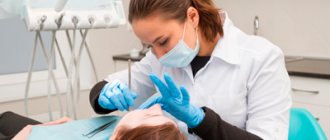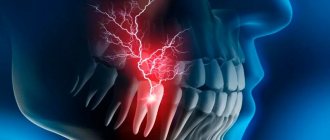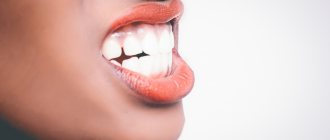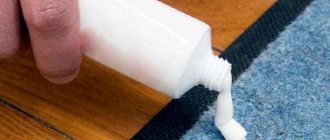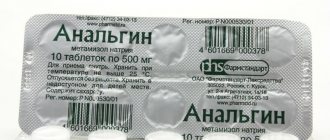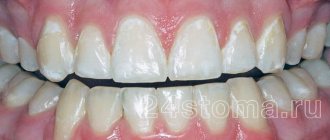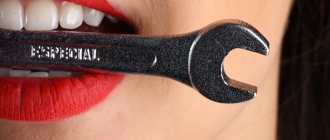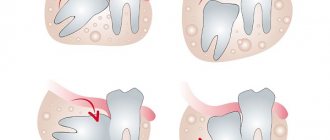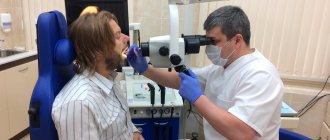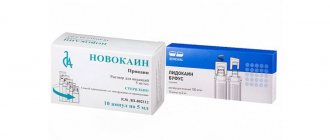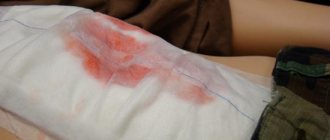From this article you will learn:
- why do teeth hurt, what emergency help is needed,
- what to do if a child has a toothache, how to numb the pain,
- toothache during pregnancy: what to do.
Pain in the teeth is always a sign of inflammation, regardless of whether it occurs in a damaged tooth or after treatment. You can urgently reduce pain in two ways: either by urgently seeking dental help, or
with the help of analgesics.
But you must understand that if you have a toothache, then in any case it will require the intervention of a dentist, and analgesics will only allow you to delay a visit to the doctor.
Causes of acute dental pain
The following are the root causes of acute toothache:
- Caries. Exacerbation of dentalgia causes food to get into the inflamed area. The sensations are characterized as aching, wave-like.
- Periodontitis (inflammation of the gums) . Manifested by throbbing pain. The patient observes tooth instability, which is associated with the looseness of the inflamed gum tissue.
- Violation of the integrity of the enamel . The condition causes mechanical damage to the jaw (teeth), long-term lack of treatment for caries. Several hours may pass from the moment the defect appears to the first pain.
- Pulpitis. It manifests itself as intense pain that does not respond to the analgesics taken. The wave-like nature of the unpleasant sensation is explained by the transition of caries to the pulp, which is supplied with a large number of nerve fibers. The pain covers the ear, adjacent teeth, and spreads to the temple.
- Periodontitis. The pathology is caused by mechanical damage to the tooth and is characterized by an inflammatory process of the periosteum ligaments. These structures help hold the tooth inside the socket. Manifests itself with sudden, sharp pain. Against the background of infection, a cystic neoplasm or granuloma forms inside the periosteum.
Each of these conditions needs to be treated. If the patient does not want to see a doctor, the risk of complications increases. These include: osteomyelitis (destruction of bone tissue), abscess, phlegmon (pathologies mean massive suppuration of the gums and tooth sockets).
Methods of pain relief in children
To combat the problem, it is not advisable to give medications to children. To reduce attacks of pain, adults need to thoroughly clean the child’s mouth with toothpaste and remove food debris from carious cavities. If the child is not allergic to bee products, then a small piece of propolis can be placed on the problem area. It is recommended to wrap the product in gauze before use. To protect the baby's delicate mucous membranes from damage.
Aching pains can be easily eliminated with the help of a soda solution. Children who do not know how to rinse their mouths are asked to hold the water with the solution for a while. This method neutralizes the effect of pathogenic flora
You can provide first aid to your child at home using various oils. To do this, add a few drops of clove or fir oil to a glass of water and ask the child to hold the solution in his mouth. Any of the proposed methods cannot have an immediate effect. To distract children from unpleasant symptoms, you can read a book or play a calm game.
Non-dental reasons
The doctor’s task when treating a patient with pain is to establish that it was dental problems that caused the deterioration in health. For this purpose, the specialist conducts differential diagnostics. The doctor compares and then excludes other diseases that manifest symptoms similar to dentalgia.
The specialist will have to make sure that there are no pathologies of the neurological, cardiovascular system, or ENT organs. These diseases include:
- Neuralgia . The trigeminal nerve is present in the human body. The structure provides sensitivity to the face and oral cavity. With inflammatory damage to the trigeminal nerve, the patient experiences intense pain. Clinical manifestations are complemented by irritability, swelling of the cheeks, and lacrimation. Standard analgesics are practically ineffective, and when they reduce discomfort, the result does not last long. Inflammation of the trigeminal nerve is treated by a neurologist. An experienced dentist is able to immediately determine that the disease does not apply to his profile.
- Migraine . The headache is characterized by unilateral localization. The patient's general well-being worsens from loud sounds and bright lights. The location of pain can migrate - cover the temporal, parietal region. Debilitating discomfort spreads to the orbit and frontal part. When the condition is left untreated for a long time, standard analgesics do not have the expected effect. Then the intensity increases, and the patient mistakenly perceives the headache as a toothache.
- Otitis. Inflammation of the ear canal most often occurs in children, but also occurs among adults. Clinical manifestations of the disease are hearing loss, throbbing pain on one side of the head. An unpleasant sensation spreads to the lower jaw.
- Violation of the functional ability of the heart (angina pectoris, myocardial infarction). Pain syndrome is predominant in this case. An unpleasant (burning, pulsating) sensation spreads to the left shoulder blade, shoulder, and lower jaw. If the heart rhythm is disturbed, the patient notes pain in the lower jaw. This becomes a reason to suspect problems with the condition of the teeth. In the process of performing diagnostics, the doctor focuses on the clinical picture and examination results. To determine the cause of dentalgia, a person seeking help will have to undergo several diagnostic procedures.
Acupressure
Acupressure helps with various types of pain. However, you need to know which points affect certain parts of the body. Location of points:
- In the cavity between the phalanges of the fingers - thumb and index.
- At the base of the ear lobe on the side opposite to the problem tooth. The process of exposure is reminiscent of clamping a clip - you should hold the lobe with your fingers and hold it for a while.
- In the depression that is located between the lower jaw and cheek. Press with your thumb, a little forcefully. This simple action works very effectively, allowing you to either relieve pain completely or significantly reduce it. It works on problems that have arisen with the upper teeth.
- On the angle of the lower jaw. The impact helps relieve pain in the lower teeth.
- On the side of the index finger. You should look closer to the larger one, going down a couple of millimeters under the nail.
The technique will help not only relieve, but also completely eliminate pain. No time is required - according to Chinese medicine, you need to spend 3 minutes. It must be remembered that if a person begins to feel unwell, nausea or headache, then the impact on the points should be stopped.
Knowing how to get rid of severe toothache using your own body, a person can calmly go hiking or to the country without thinking about medications
In late pregnancy, such exposure is highly discouraged, since it is believed that it stimulates labor.
Toothache with sinusitis
When a patient presents with acute toothache, the doctor should rule out sinusitis – inflammation of the maxillary sinuses. Discomfort in the jaw is similar in both diseases. In case of sinusitis, the patient is concerned about:
- The presence of copious mucous discharge from the nose.
- The wavy nature of the pain, its localization in addition to the jaw - the forehead, with a transition to the area under the eyes.
- Increase in body temperature to high levels.
- Sore throat, irritation inside the throat, difficulty swallowing.
- Weakness, dizziness, apathy, dyspeptic disorders (nausea, vomiting, lack of appetite).
It is important that with sinusitis the deterioration of the condition develops against the background or after a cold. Treatment of the disease in question is carried out by an ENT doctor.
General recommendations for pain relief
The following tips will help relieve tooth pain:
- Do not concentrate on feeling unwell, try to distract your thoughts from it.
- Make sure that the disturbing part of the mouth is not clogged with food fragments. In addition to putting pressure on the inflamed area, pieces of food create a favorable environment for the life of pathogenic microflora. It is advisable to use a toothpick.
- The horizontal position aggravates the condition due to increased blood flow to the jaw. For dental problems, it is better to minimize bed rest (with the exception of high body temperature).
- Limit contact of food with the inflamed area of the mouth. When chewing food, try to use the healthy side.
- It is equally important to abandon the idea of using heat sources. High temperatures relieve discomfort for a short time. Heat can aggravate the inflammatory process if it is accompanied by the formation of a purulent focus.
Prevention
To prevent pain from overtaking you by surprise, you need to adhere to the following rules:
- Brush your teeth 2 times a day, rinse after each meal.
- Undergo a preventive examination 2 times a year.
- Consume food and water with sufficient amounts of fluoride.
- Review your diet, avoid eating unhealthy foods, as well as hot and too cold foods.
- Avoid sweets and lollipops.
These measures will be enough to provide maximum protection against toothache. If you have the slightest suspicion of changes in the condition of your teeth, you should immediately visit a doctor.
Thus, these methods are quite effective. However, do not forget that if a toothache occurs, you need to think about going to the dentist.
How to relieve acute toothache
There is a wide range of means and methods that can be used to get rid of or minimize tooth pain. All of them are divided into main and auxiliary methods and are related to official or folk medicine. Modern analgesics are aimed at eliminating pain of various types, localization, and degrees of intensity. An insufficiently pronounced analgesic effect provides:
- Nurofen . Contains Ibuprofen, a non-steroidal anti-inflammatory substance.
- Spasmalgon. The drug is made on the basis of Analgin. The drug is contraindicated for use in children under 6 years of age.
- Baralgin. Analgin produces an analgesic effect. Dosed use is acceptable even for dentalgia in children.
- Askofen . Relieves debilitating sensations due to the presence of powerful substances in the combination. They are represented by Paracetamol, Aspirin and Caffeine. Contraindicated in children under 15 years of age.
- Grippostad. The active ingredients of the drug are Paracetamol and vitamin C. Ascorbic acid prolongs the analgesic effect of the drug. The use of the drug requires a high level of care and caution.
- Actasulide. An effective medicine that provides relief from pain, but the patient’s age under 12 years is a limiting factor. Direct contraindications for use are the presence of stomach ulcers, duodenal ulcers, kidney failure, liver failure; impairment of the functional ability of the heart.
- Nise. Eliminates dentalgia in 5-7 minutes. The effect lasts for 6-8 hours, but the root cause of the unpleasant sensation is of decisive importance. Taking several tablets at once is neither practical nor safe. To achieve the desired effect, just take 1 Nise tablet with water.
- Ketorol. A powerful pain reliever, but you can take it no more than once every 3 hours. Before visiting the dentist, you should refrain from using Ketorol for at least 4-5 hours. Since the drug negatively affects the possibility and duration of anesthesia, it distorts clinical manifestations.
- Tempalgin . Eliminates low-intensity dentalgia. The permissible frequency of use is 4 times a day, 1 tablet. Before using any of the listed drugs, it is important to read the accompanying instructions.
The use of the medicine will not cause harm if the patient is not allergic to its active substances. In order to determine sensitivity to the drug, you should initially take ¼ of the tablet and monitor how you feel.
If after half an hour there is no dizziness, nausea, itchy skin, lacrimation, or shortness of breath, you can take the rest of the tablet. Then the expected analgesic effect occurs, and the patient knows for sure that the drug is safe for him.
Tablets for children
As you know, most of all tablets recommended for adults are absolutely contraindicated for children. It is for this reason that it is better not to take risks and choose drugs that are appropriate for the child’s age. Today in pharmacies you can find a huge selection of gels, ointments, analgesic syrups, rectal suppositories that will help cope with childhood dentalgia:
- Cholisal-gel.
- Dentinox gel.
- Children's Nurofen (drops, syrup, tablets)
- Panadol rectal suppositories
- Viburkol rectal suppositories.
The instructions for use in the above-mentioned drugs and their analogues often contain an age limit - from 6 or 12 years. However, on the recommendation of a doctor and in the presence of acute pain, it is permissible to give these medications to children under 6 years of age.
As in the case of pregnant women, children are recommended to use folk remedies to eliminate dentalgia - rinsing, cooling, garlic.
Additional recommendations for pain management
Ketorol, Pentalgin, Ketanov, Nimesulide have a high analgesic effect. Despite the guaranteed analgesic effect, these medications should not be taken by pregnant women and children. The active components of analgesics easily cross the placental barrier and can harm the fetus. As for children, a more careful, accurate calculation of the dosage of the drug is required. You will not be able to install it yourself.
Ultracaine injection eliminates dentalgia for 6 hours. But performing the injection yourself is contraindicated. At home, you can moisten a cotton swab with one of the indicated solutions (you must first carefully open the ampoule). Then apply the prepared tampon to the gum. The first signs of effectiveness are a decrease in the sensitivity of oral tissues.
The use of antibacterial drugs is contraindicated. These medications require schematic administration and are prescribed only taking into account the existing pathology.
Taking analgesics must be stopped before visiting a doctor (at least 3 hours before). The active ingredients in painkillers reduce sensitivity in the mouth. The patient cannot accurately explain to the doctor the location of the pain and its nature. This makes it difficult for a specialist to diagnose.
If the dentist confirms that the pain is caused by dental problems and excludes the presence of other pathologies, anesthesia will be required. A patient who has been taking analgesics for a long time to feel better, such an action reduces the possibility of performing it.
Traditional methods of relieving toothache
To eliminate pain before visiting a doctor and not make a mistake in choosing an analgesic, it is advisable to use traditional medicine methods. The following remedies are known to have beneficial effects in inflammatory and destructive processes of teeth:
- Sea salt. The substance is enriched with microelements, minerals, provides a bactericidal effect - destroys pathogens. It is both a therapeutic and prophylactic agent. Prevents the development of complications, prevents tooth loss, strengthens gums. Dissolve 1 tbsp. spoon of salt 250 ml of warm water, stir, avoiding sediment, rinse until dentalgia is eliminated.
- Baking soda. It is known for its antiseptic properties - it relieves inflammation, thereby eliminating tooth pain. To prepare a soda solution, use 1 teaspoon of powder per 1 tbsp. warm water. Rinse up to 5-6 times a day, then be sure to visit a doctor.
- Alcohol-based drops: peppermint, valerian, camphor solution. The healing properties are explained by the presence of essential oils in the composition. The main effects are the elimination of the pulsating phenomenon, the destruction of pathogenic microorganisms, and the normalization of blood supply. Use to prepare a compress. Fold a small piece of gauze several times, moisten it with a healing solution, and apply it to the diseased tooth.
- Chamomile decoction . Application allows you to get rid of the inflammatory process in the oral cavity, reduce or eliminate discomfort. To prepare the remedy, 2 tbsp. l. dry chamomile (sold at any pharmacy) pour 2 tbsp. boiling water Wait 10 minutes, strain, drink as tea (do not drink the drink at high temperatures). It is advisable to rinse the mouth with a warm chamomile decoction.
- Sage decoction has an anti-inflammatory and bactericidal effect. Due to the presence of alkaloids in the composition, it is an anesthetic. Used for rinsing the mouth.
- Clove oil has antiseptic and soothing properties. If dentalgia occurs, moisten a cotton swab with a small amount of this product. Apply to the problematic gum. An alternative way to use clove oil is to rub the area of your mouth that is bothering you. In this case, an additional beneficial effect is gum massage. It helps improve blood circulation in their tissue.
- Echinacea infusion. It has antioxidant properties and increases the body's resistance at the local level. To prepare the drink, use 4 tbsp. l. dry raw materials per 2 tbsp. boiling water Wait 10-15 minutes. to activate all the beneficial properties of echinacea under the influence of high temperatures. Use the product for rinsing.
- Propolis . The beekeeping product has an antiseptic and anti-inflammatory effect. To achieve this, apply a piece of the product to the problem tooth.
Vodka is known for its anesthetic properties. To eliminate pulsating dentalgia, you need to rinse your gums with vodka, tilting your head to the side of the problem area.
- Garlic. Has intense antiseptic properties. It is enough to apply 1 clove of garlic to the inner surface of the wrist, then securely secure it with a bandage.
- Furacilin. The solution helps reduce swelling, reduce inflammation of the gums, and reduce the intensity of pain. These phenomena are explained by the property of furatsilin to destroy pathogenic microflora.
- Black radish juice . It has a wide range of healing effects - it functions as an antibiotic, strengthens the gums (when they become inflamed, they become loose). Provides protection to problem areas of the oral cavity.
- Ice Cube. Provides pain reduction. But it is characterized by a short-lived effect, aggravating the condition when the sensitivity of the enamel increases.
The listed remedies and recipes do not replace necessary treatment. Therefore, even after eliminating dentalgia, you should visit a dentist. The absence of an unpleasant sensation does not indicate normalization of the tooth’s condition. In addition, the pain syndrome may resume after a certain period of time.
Folk remedies
You can relieve toothache with folk remedies at home without pills. They are less dangerous than pharmacological agents, but they can cope with the symptoms of dental diseases no less effectively.
Folk remedies can be used by almost all categories of citizens
Mouth rinse
This method must be resorted to immediately after pain in the teeth appears. To improve the effectiveness of the procedure, it is necessary to thoroughly brush your teeth with a brush and toothpaste before the procedure. Solutions used for the procedure must have an antibacterial effect.
Traditionally, a soda-salt solution is used to treat the mouth. It is prepared at the rate of 1 tsp. each dry ingredient in 200 ml of boiled water. Salt inhibits the activity of pathogenic flora in the mouth, and soda helps reduce the severity of soft tissue swelling. In addition, this treatment method has practically no restrictions: it is relevant for a child, a pregnant woman or a person with allergies.
The rinsing procedure is repeated when the intensity of the pain increases or every 2 hours. The following medications are also suitable for preparing solutions:
- iodine;
- propolis tincture;
- hydrogen peroxide;
- herbal infusions (chamomile, calendula, oak).
Iodine is used as the main ingredient in an anesthetic (a few drops of the drug per 200 ml of water) or in combination with soda and salt. Hydrogen peroxide is added to water at the rate of (1 tablespoon per 1 glass of boiled liquid).
Herbal decoctions are prepared according to the traditional scheme: 1 tsp. any herbal component (or several herbs) pour 250 ml of boiling water and leave until cool (30-40 minutes).
Medicines for external use
Food and herbal ingredients are also effective in eliminating toothache, as are rinses. It is necessary to list the main folk remedies for toothache, which have long been used to combat signs of dental disorders.
Aloe. The sheet is cut lengthwise and the smooth side is applied to the inflamed gum. You can tie a plant leaf to the cheek on the side of the problem element. Relief occurs an hour after the procedure.
Propolis. The plant is thoroughly kneaded in your hands before use. The plant will have the desired effect only with slight heating (up to 36-37 degrees), otherwise there is no point in using it. The finished medicine is stored in the refrigerator and warmed in your hands before each use.
Any vegetable oils (tea, mint, eucalyptus). A few drops of oil are dripped onto the crown of the destroyed element. If a carious cavity is visible in the element, then you should try to pour liquid into this area.
To obtain the effect, it is important to follow the recipes for preparing the products correctly.
Tinctures containing alcohol or vodka. The ingredient inhibits the activity of pathogenic microorganisms in the oral cavity, thereby reducing the pain of the problem area. To combat the problem, tincture of motherwort or calendula is perfect.
Aluminium foil. This method of dealing with jaw pain is not the most popular, but it quickly eliminates unpleasant symptoms. To do this, make a narrow bridge from a sheet of foil and apply it to the inflamed gum using an adhesive plaster.
Unconventional ways to relieve pain
It will be possible to enhance the analgesic effect of drugs and alternative remedies through Japanese massage. Dentalgia will decrease or be eliminated if you do the following:
- Massage vigorously the space between the nose and upper lip.
- First, apply a little pressure on the earlobe, then run your fingers along the edge of the ear. Repeat several times.
- Using light movements, massage the carotid artery located on the side of the problematic tooth.
To reduce dentalgia, regular chewing helps - use mint leaves, plantain leaves, and a piece of peeled ginger.
Children and pregnant women
During pregnancy and childhood, dentalgia occurs no less frequently than in representatives of other social groups. Considering the characteristics of both cases, the selection of an analgesic presents certain difficulties. The active components of painkillers are absorbed into the blood of the fetus - they can harm it, cause developmental defects, and fading.
The first dental problems are caused by the growth of teeth. The phenomenon is observed at the age of 4-6 months. For a child, the physiological process during which bone tissue cuts through the gums causes pain and stress. Then it is advisable to apply applications of gels or medicinal pastes to problem areas. They will reduce pain, relieve swelling, inflammation - the child will be able to calm down, fall asleep, and his appetite will normalize.
Acute pain in children occurs in response to a food particle entering the cavity of a carious tooth. A pulsating sensation occurs, which is often confused with inflammation of the ear. Dentalgia is also caused by food getting into a healthy tooth - the foreign body compresses and irritates the enamel. Feeling better is facilitated by the evacuation of the trapped substance - this is easier to achieve by rinsing the mouth. It is advisable to use a baking soda solution.
Dentalgia in pregnant women is treated with gels intended for children - so as not to harm the developing child in utero. They do not contain harmful components and are safe for the fetus. Particular care should be taken during pregnancy in the 1st and 3rd trimesters.
To normalize the well-being of children and expectant mothers, the following remedies are suitable:
- Clove oil.
- Liniment “Star” (the drug needs to be lubricated on the problematic gum).
- Herbal remedies – chamomile, calendula, sage. Use as a decoction for rinsing the mouth.
- It is permissible for children to take Nurofen (the manufacturer indicated the permissible dosage in the instructions).
- Rinse with a solution of baking soda and sea salt.
After you feel better from taking the above remedies, you should rush to the dentist to receive qualified medical care.
Toothache during pregnancy: what to do
So, what can you do to relieve pain if your tooth hurts during pregnancy... Remember that even approved medications should be taken by pregnant women only after consulting a doctor.
- Nurofen 200 mg or 400 mg (Fig. 7-8) - it can only be used in the 1-2 trimesters, but not in the 3rd trimester. Nurofen is available in dosages of 200 and 400 mg. Pregnant women can use both dosages. But we recommend that if the pain is not very severe, use a dosage of 200 mg (no more than 4 tablets per day). If the pain is very severe, then the dosage is 400 mg, but not more than 3 tablets per day.
- Paracetamol 500 mg - can be used throughout pregnancy, preferably only after consulting a doctor. No more than 2 tablets per day.
Important: you must understand that analgesics are only a temporary solution to the problem. If you have a toothache, you will still need to see a doctor. There are periods of dental treatment for pregnant women, during which dental treatment is quite safe for both the mother and the unborn child.
Acute toothache at night
A toothache that occurs at night can cause a person to wake up. Especially if it is caused by pulpitis, caries - if they are present, the unpleasant sensation is difficult to eliminate with analgesics. It is also not uncommon for dentalgia to worsen in the evening and to bother you throughout the night. It is exhausting, causes weakness, irritability, since the fact of discomfort is complemented by a lack of rest.
Independent elimination of dentalgia (without the use of drugs) is a rare case. Most often, this phenomenon is observed precisely during nighttime dental pain. The inflammatory process is regulated by the adrenal cortex. The hormones it produces stop the intensity of the pathology. The reason why improvement in well-being occurs closer to the morning is that in the evening the adrenal glands slow down their activity.
If the toothache occurs outside of the home
Acute dentalgia develops regardless of the location of the person. It is especially difficult if the phenomenon occurs while he is at work. The only correct tactic is to ask management and visit a doctor. If for various reasons it is impossible to leave the workplace, you should immediately take a painkiller. Ketanov, Dolaren are characterized by a long-lasting analgesic effect. 1 tablet is enough to eliminate dentalgia for 5-6 hours. By then the workday will be over and you can visit the dentist. Additionally, you should rinse your mouth with soda or saline solution.
Methods to combat symptoms in pregnant women
Often, while carrying a child, women encounter dental diseases. What to do in such a situation? After all, pills and potent folk remedies are prohibited during this period.
Clove powder, which is applied to the painful area, will help relieve the intensity of discomfort for pregnant women. To rinse the mouth, it is recommended to use saline solutions with the addition of herbal infusions based on chamomile or calendula. A pregnant woman can put a plantain or aloe leaf to her gum. These methods are absolutely safe and do not in any way affect the formation and development of the unborn child.
If toothache bothers you on vacation
If dental problems begin to bother you long before your vacation, it is better to stop them first and then go on vacation. It is possible that the specialist will determine the possibility of delayed treatment - upon the patient’s return.
On the eve of the trip, it is important to carefully read the information in the contract concluded with the insurance company. It prescribes the type of assistance that you can count on when the need arises.
Some insurance firms use compensation practices. The costs that the patient incurred while abroad are returned to him upon arrival home. But subject to the presence of a receipt for payment.
In order not to overshadow your vacation with unnecessary troubles with finding a dentist abroad, it is advisable to get a temporary filling from your dentist. Then, upon return, you can begin full treatment.
Toothache is a clear sign of poor health. Only a doctor can determine whether the dental or other area is suffering. He relies on professional experience and examination results to make a diagnosis. The patient cannot solve his problem on his own - he should consult a specialist and receive competent treatment.
